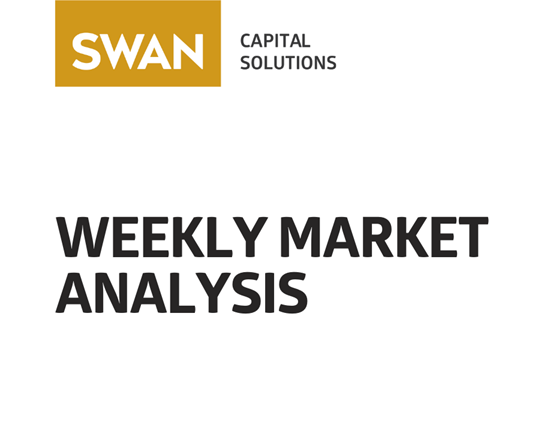US Credit rating downgrade supports ABUSA theme as UK reverses Brexit deal
The global financial landscape has recently been shaped by significant developments, including the downgrade of the US credit rating and the growing prominence of the "ABUSA" (Anywhere but the USA) investment theme. These events have sparked debates about the sustainability of US economic policies and the shifting preferences of global investors.
Last week, market sentiment improved significantly following news that President Donald Trump was willing to negotiate with Chinese officials. The two parties agreed to a 90-day suspension of tariffs, with rates capped at 10% on both sides. This development led to a market rally, erasing losses incurred after "Liberation Day" and propelling equities into a new bull market. Investors must now face heightened uncertainty surrounding economic growth and inflation. While hard data (statistical estimates) remain stable, soft data (sentiment surveys) already indicate expectations of slower growth and potential price increases. For instance, Walmart's recent announcement about passing rising operational costs onto consumers serves as a warning sign. If even a retail giant with an efficient supply chain cannot absorb these costs, smaller competitors will likely face even greater challenges.
The downgrade of the US credit rating has further complicated the economic outlook. Driven by unsustainable deficits, entitlement spending, and a rising debt burden, this downgrade casts doubt on the optimism that fuelled last week's market rally. Although markets shrugged off the news during Monday’s session, the long-term implications are clear. The long end of the yield curve is expected to rise, increasing pressure on instruments like TLT and creating opportunities for short positions. Additionally, higher 10-year rate linked to bank’s lending rates will likely raise borrowing costs for homebuyers, negatively impacting the property market and homebuilders.
These developments have bolstered the ABUSA movement, which advocates for diversifying investments away from the US. Valuation metrics in the US have been steeper than other regions based on the fact that the US economy deserved this premium, given their “exceptionalism”, is now being questioned. Year-to-date, US equities have underperformed compared to global markets, as reflected in the MSCI World Index. This trend has also contributed to the downward pressure on the USD since the beginning of the year. Meanwhile, economic reforms in Europe and China are making these regions increasingly attractive for long-term investments as they aim at improving their ease of doing business and overall productivity of their economies.
News of the agreement reached between the UK and EU further supports this trend as the reverse-Brexit theme is on, marking a pivotal shift for a country that once praised the benefits of exiting traditional trade blocs. A decade later, officials now recognise the value of collaboration and mutual support. Drawing a parallel with what the US has done since the beginning of this year, it would not be surprising to see US officials try to do damage control in a few years by trying to save relationships with existing allies.
The US credit rating situation bears similarities to recent challenges faced by Mauritius. Earlier this year, Moody's placed Mauritius on its watchlist and could potentially downgrade the country’s credit rating early next year. Same as the US, the rating agency questioned the debt levels of the country and its affordability along with ability of Mauritius to generate enough revenues. The upcoming budget announcement on June 5th is expected to include difficult decisions, as per officials.
On the equity front, the SEMDEX ended the week in positive territory, slightly up by 0.21% to 2,422.11 points. On the other hand, SEM-10 inched up to 0.19%, as the broader market outperformed the heavy-weights. Excluding listing of Stevenhills, total market value traded reached 278.1m, 24.1% higher than that of last week. Trading activity was driven by results publication for the quarter end March 2025. Activity remained geared towards MCBG, who accounted for around 30.2% of TMT. Foreigners were net buyers of OM stocks to the tune of Rs 22.4m with Stevenhills being the main driver of foreign inflow (+9.5m), followed by CIEL (+4.5m) and PBL (+2.5m). Among individual names, MCBG had a slight gain of 0.16% over the week to close at Rs 466.50, while SBMH fell by 6.15% closing at 5.80 as the stock traded ex-div during the period. Hotels showed contrasting results with NMH increasing by 1.53% over the period to close at Rs 13.30, and SUN gained 2.81% to Rs 36.60. Contrastingly, LUX fell by 3.33% to close at Rs 46.50. As for sugar conglomerates, TERA gained 7.14% to close at Rs 22.50. Likewise, MTMD gained 1.33%, closing at Rs 19.00. ALTG, however, closed in the red at Rs 13.00 (-0.38%). As for conglomerates, IBLL (+2.50%), ROGE (+0.97%) and CIEL (+0.25%) closed positively at Rs 32.80, Rs 36.25 and Rs 7.96 respectively. Contrastingly, ENLG was down by 0.51% over the week to close at Rs 29.45.

